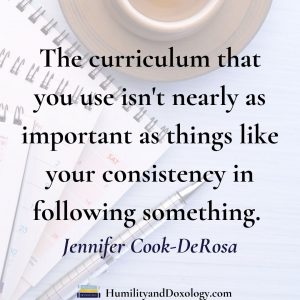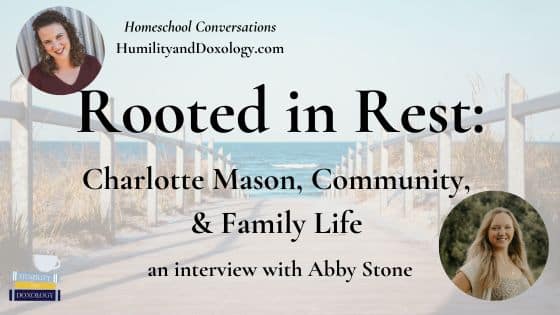But, what are we going to do about college?! Today’s guest brings her experience as a homeschool mom, college administrator, advisor, and teacher to the conversation about homeschooling for college credit. I loved Jennifer Cook-DeRosa’s encouragement and down-to-earth approach, and especially her reminder that there is no one-size-fits-all model for this homeschool high school and college/career journey. This is a conversation you’ll want to listen to today, then save and listen to again as you consider choices for your homeschool teens!
Be sure to check out all the other interviews in our Homeschool Conversations series!
Watch the video. Listen to the podcast. Read the show notes. Share with your friends!

{This post contains paid links. Please see disclaimer.}
Who is Jennifer Cook-DeRosa
Jennifer Cook-DeRosa, M.S. is the founder and Executive Director of Homeschooling for College Credit. Homeschooling for College Credit is a robust online community that is free to join and run entirely by a team of volunteers. Each year, her social organization helps thousands of homeschooling families learn how to inject college credit into their homeschool program. Jennifer brings 25 years of leadership experience as a college administrator, advisor, teacher, and homeschooling parent to Homeschooling for College Credit.
Jennifer’s inspirational teaching style encourages parents to reconsider the wisdom of getting kids INTO college, and instead builds a plan to get them OUT. Through resourceful high school planning for homeschooled teens, Jennifer teaches parents how to make the most of their teen’s high school career by injecting college credit, building an exit strategy, and stepping forward as their teen’s best guidance counselor.
Jennifer and her husband have 4 sons, all homeschooled since Day 1. Their sons all began earning college credit in high school, and collectively her family has 11 degrees from 8 different colleges. Professionally, Jennifer currently serves as the Executive in Residence at Franklin University and sits on the Homeschool Advisory Board of Excelsior College. She is the author of Homeschooling for College Credit (2018) and The Extreme Cheapskate’s Guide to College (coming 2022).

Watch my interview with Jennifer Cook-DeRosa
Prefer to listen to your content? Subscribe to Homeschool Conversations on Apple podcasts or wherever you get your podcasts so you don’t miss a single episode!
Amy Sloan: Hello friends. Today I am delighted to be joined by Jennifer Cook-DeRosa. She is the founder and executive director of Homeschooling for College Credit, which is a robust online community that is free to join and run entirely by a team of volunteers. Each year, her social organization helps thousands of homeschooling families learn how to inject college credit into their homeschool program. Jennifer brings 25 years of leadership experience as a college administrator, advisor, teacher, and homeschooling parent to Homeschooling for College Credit. I just love that you have the professional side and the real-life homeschool mom side which is going to be of great use in our conversation today.
Jennifer and her husband have four sons all homeschooled since day one. They all began earning college credit in high school. Collectively, her family has 11 degrees from 8 different colleges. Professionally, Jennifer currently serves as the executive in residence at Franklin University and sits on the Homeschool Advisory Board of Excelsior College. She’s the author of Homeschooling for College Credit, and coming soon, The Extreme Cheapskates Guide to College, something we will all need help with, I’m sure. [chuckles] Oh, Jennifer, here at the beginning, could you just tell me a little bit about your family and how you came to begin homeschooling?

Jennifer Cook DeRosa: Yes, Amy. Thanks for having me. I love to talk about the homeschooling part of it in addition to just the college credit because obviously, that’s what I spend most of my time focusing on now. We’ve been in the trenches since day one just like your listeners. I started homeschooling our oldest son pretty much immediately. I was one of those hyper [chuckles] all-in kind of parents. I pulled back on my career and I became a stay-at-home mom, and I just went all in. I started really enthusiastically with him. We homeschooled preschool and I had curriculum and all this ridiculousness.
I say ridiculousness in hindsight. As time went on and we had more children, I learned that homeschooling didn’t have to look like that. It evolved for us over those years. My oldest is now 26. It’s been a long journey, but it’s also been a short journey. I just remember it so clearly like it was yesterday when we made that decision to homeschool. I feel very connected to the new mom who’s full of anxiety, as well as having a little bit of experience and other things to share too.
Growing in Homeschool Wisdom
Amy: How did your approach to homeschooling philosophy and just approach to homeschooling life grow and change over those years from this initial gung-ho, very excited moments, trying to do all the things, and then over the course of time?
Jennifer: It’s funny because I’m 50 years old, so I’ll just share my age. When I started homeschooling, I didn’t have the internet, for instance. That is a huge difference. I feel like the homeschool moms now are so lucky to have fellowship across. There’s no boundaries as to who you can connect with, and you can find support. That really wasn’t much of an option when we started. When I started, I did belong to my local homeschool group and I was very active and involved in that. As far as outside of my little curated circle of friends, my support came from magazines that would come in the mail. It felt like there were others homeschooling out there, but I didn’t have that one-on-one connection.
I would say that having access to the internet and a community that was beyond just my neighborhood was amazing. I think that really changed my view as far as what homeschooling should look like, and my own educational philosophies changed as well. I think that I’ve come full circle now, where I went through a lot of different tests.
As we went along, I was pretty susceptible to the latest and greatest curriculum. If I’d go to a curriculum fair or something like that, and I’d see something, I would try it. If I had a friend whose child was learning something really cool, I would jump in and try it. We did a lot of that. Then as they got older, we definitely chilled out a lot more, I think.
Amy: I’m a second-generation homeschooler. I think back to what my parents and my husband’s parents were doing like you said, homeschooling without the internet. There were definitely strengths to that. You weren’t distracted, or maybe inundated with all of the shiny objects, but it was also so much more challenging. We are so richly blessed now to have access to a community, like-minded folks, ideas, creativity, that ability to see things outside of the way we would normally approach things. To learn from one another is really a gift today.
Jennifer: It really is. Even learning things, if something was really challenging or hard for my kids, then I didn’t have maybe the deep bench of resources that we have today. I couldn’t go to Khan Academy and look for videos on how to solve fractions or things that I would just do easily right now, they would be hard for me to– I’d have to think of something, or I’d have to turn to a friend or use those resources that were available to me. I definitely think homeschooling now is a lot better. I think that just the community in and of itself, and having the relationship with other people, other homeschoolers that you can build on and get encouragement from has made a huge, huge difference.

Were there things you worried about as a newer homeschool mom that you now realize you didn’t need to worry about?
Amy: Were there any things that you maybe worried about as a new homeschool mom, especially thinking about homeschooling those older students in the teen years that looking back on it now, you’ve realized you didn’t really have to worry about?
Jennifer: I think there’s a cliche that every child is different. We hear that so often that I think we dismiss it, but it’s actually true. I think when I look at my kids as preschool or kindergartners, and I look at them now as men, really their personality is pretty much the same. My oldest who doesn’t like change as a three-year-old still doesn’t like change today as a 26-year-old. My kindergartner who was just vibrant, and the one who would make the ramps and jump over them on his BMX bike as a four-year-old, he’s still that outgoing, adventurous adult.
I think one of the things that I wish I maybe would have spent less time on is to try and so heavily influence some of their strengths and weaknesses.
Definitely, the values and character are very important. Obviously, those are the things we want to influence. Underneath of that, they’re all people, and they’re humans, and they have their own ideas as far as what they think, and we want that. I also think that one other thing that I worried about in the beginning was I really wanted to raise good kids, and so I was pretty susceptible to a lot of the different parenting styles and things like that.
What changed for me was thinking about what I wanted them to be as adults instead of, yes, we need to get through the day, but how they were going to turn out as adults.
I wanted men who were going to be strong leaders, who were going to be independent thinkers, and a lot of other character traits that I’m sure are important to your family. Sometimes as children, those are hard to accept. If you are cultivating a strong-willed child, that is hard to parent. As an adult, that’s really encouraging and just a great character trait to have. Sometimes it’s hard to think about how things are going play out long-term, but that would be one.
I would also say that the other thing that I worried about way too much unnecessarily was curriculum. I just always felt like there was a perfect curriculum, and I just never could find it. We would try something and it would start to work, and then that company maybe it didn’t go on beyond a certain grade, or I would have another child come up behind them, and then that was a disaster for that child. I was always so concerned about the curriculum. Really the curriculum that you use isn’t nearly as important as things like just your consistency in following something.
If you’re teaching them to read and you’re just reading every day, they will learn to read. Enjoying books together, reading, doing math every day, these are oversimplified suggestions, but in all honesty, it didn’t matter which math book as long as they were doing math. It didn’t matter which history book as long as we sat down and we talked about it, and we went through it together. I think those are probably the three things that I worried about a lot, but maybe didn’t need to.
Amy: Oh, I just love to hear that perspective from you. That’s exactly the way I approach homeschool planning. I actually have a free planning guide. One of the questions that I say you need to ask before you even start thinking about curriculum is what kind of human do you want to raise? Those big picture, non-academic goals. What man or woman do you want them to be? I think that’s really important to ask those big picture questions first before you get distracted by all the curriculum options.
Then totally, that feeling that if we just picked the right curriculum, our kids would never cry over the math or it would solve all our problems, everyone would get along if we just had the right curriculum. That’s just not true. Not the perfect curriculum, but just that simple consistency is so valuable for sure.
Misconceptions about Homeschooling High School
Let’s transition a little bit to talking about high school and college. What are some of the misconceptions that you think homeschoolers have when it comes to high school?
Jennifer: You should know that when my oldest was approaching somewhere around the middle or the end of middle school, I panicked. I completely lost my mind. I really felt like I was not going to be capable of getting my kids through high school. I was feeling really like I didn’t know enough to do the job well. I thought maybe that it was better left to the experts. I had a lot of fears.
I think one of the misconceptions is that those fears are all true and they’re not true. First of all, if you have taught your kids to read, and you’ve taught them math, and you’ve taught them all of the hard lessons of life up to this point, you have absolutely all the skills needed to take them the rest of the way.
Putting on my college hat and taking off my mom hat for a minute, I can tell you that as someone who has taught other people’s children, as someone who has worked in the college system, they don’t care as much about your kids as you do. That’s not meant to be a criticism. That’s just the truth. They don’t care about how they finish, what kind of exit strategy you put in place for homeschool. No one cares about that as much as you and your family does. That’s the most important thing to know that the role and the responsibility, you really are best served to be their guidance counselor through that.
The other thing is that academics are not the whole thing. It’s a piece. It’s just a piece of this final bit before they launch into adulthood. It’s not the whole person. Yes, it is going to be some subjects that you might not feel comfortable teaching but you also don’t have to teach those subjects. I think that most of the parents that you’ll talk to that have kids that have gone through high school will tell you that they don’t teach every single subject. They don’t sit down at the kitchen table one-on-one the way that they did when they had younger kids. The relationship changes.
If you think about a child who can read independently, and who can write independently, that’s a different kind of situation. Also, the other thing that I think is really important is that that’s when you’re starting to think about what they’re going to do after high school. I think that sometimes, parents who use group schools, like public and private schools, may have a tendency to feel left out of that process or pushed out of that process. I would encourage parents to lean in and to get more involved in what’s coming next because that is one of the biggest life changes that happen when a child finishes high school and then they start that next thing whenever that next thing is.
Who is going to give them the guidance on a career? Who’s going to give them the guidance on how they should approach choosing a career? Who’s going to give them the advice on what amount of debt, if any, is reasonable for a young person to take on? What does an occupation do for your family, for your lifestyle? What careers are going to be compatible with your values and your goals? There’s not a person whose job it is to advise your kids in that way. That’s an opportunity for you and your family to do that. When you talk to your kids, I think it’s really important to not try and neutralize those opinions. I think they’re important.
If you have in your family, a daughter who wants to be a mom and be a stay-at-home mom, then why would you let her take on $100,000 worth of student loan debt? That’s inconsistent with what her goals are. If you have a student who doesn’t want to go to college, forcing them to go may not be the best plan when instead there’s all kinds of other things to do. These are conversations that you get to have. If your child were in a group school, they would not get that one-on-one attention, they would not get that one-on-one care.
The other part of that is that when your child would leave the expert guidance that they would be getting, that counselor or that advisor or that administrator is done with them, but you get to have this person as your child the rest of their life. You get to see them follow through this next season.
Whether it’s college, or military, or starting a business, or taking a gap year, whatever it is, it’s very important to lean in and get more involved over this next process and to not pull back.
Amy: That’s such a good encouragement to me right where I am in the midst of my own homeschooling journey. My oldest is halfway through his high school years. You would think that having graduated from homeschool myself, and not had any trouble getting into college or anything like that, you would think that I wouldn’t be worried at all. Periodically, all of that panic will come back to mind like, “Oh, no, what am I doing? I don’t want to miss anything.”
I appreciate your encouragement to lean in and be involved more because I think especially as a mom of a son, or maybe it’s also that firstborn thing, you’re like, “Okay, wait, I’m supposed to be helping with independence. I don’t want to interfere too much. How much am I supposed to help?” Just to hear you say, “No, this is part of your job. You’re the guidance counselor; they would be giving advice.” Even more so because I’m also the parent who loves him and knows him better than anyone else would. I’m calming down a little bit now. [laughs]
Jennifer: No one is going to be as good at this job as the parent. It’s interesting to me when I hear parents so quick to give up that opportunity to make those influential decisions. I’m trying to just keep it light but I will say that there’s a 50% completion rate among students who start college. 50% don’t complete. If 50% of them complete, then the other 50% don’t. 100% of people going in all thought they were going to complete. What happens with half of those students?
The statistics vary depending on what source you look at, depending on where they go to school. In reality, I think it’s obvious if you look at those numbers that it’s not a one-size-fits-all solution. It’s okay if your student’s plan doesn’t look like the other person on Facebook’s plan who’s posting about this really exciting thing that their kids are going to do. Again, it’s that cliche, all kids are different but really, let’s let them be different. If we can just stay true to that all the way through, it really will give you a fruit at the end, I promise.

Pursuing College Credit During High School
Amy: What are some of the benefits of pursuing college credit during high school? On the flip side, are there any counter reasons or reasons there might be a teen for whom that wouldn’t be a good option?
Jennifer: First, I think what I want to do is I want to redefine what we think of when we think of college. Sometimes when we think of college, we all have this notion that our kids are going to pack up the station wagon and go away for four years somewhere. That is not the case anymore. I think we can blame it on technology if we want to, or COVID even. College looks different now than it has in the decade before. You may think of college as a four-year degree, but it could be a two-year degree, it could be a certificate or a diploma program. It could be anything that is really getting them trained for their future.
The education is one piece of it, but it’s only part of it. Ultimately, even if they are getting a liberal arts education, they will at some point have to launch into a career. When you think about earning college credit in high school, I don’t always think about it in terms of having the plan of sending a child off to a four-year liberal arts university. I think that there are definitely many students who take that path, but the overwhelming majority of the families that I communicate with through our online community are just normal, average, able students who want their kids to go to either a two or a four-year program so that they can get a decent paying job and not come out burdened with student loan debt.
Adjusting our goals for college
When you talk about adjusting your goals a little bit, there’s about 4,000 colleges out there. I think what sometimes happens is we hear about competitive admissions that maybe attracts, let’s say, the top 20 or 30 of those schools. We get caught up in trying to jump through the hoops that would be necessary to gain admission to one of those top 20, 30, 40 schools when in reality, there’s thousands of other colleges and opportunities that exist beyond those just top few schools. I think you have to think about what college looks like may not be what you think it is.
You may find that your local community college has programs that are open to high school students. It’s very common for programs in the community college to open their doors to high school students. They have programs called dual enrollment. There’s other names for it, but basically what that means is instead of taking let’s say 11th or 12th grade English as a homeschooler with your mom, you can do it at the community college and you can take English 101. You then award them high school credit on their high school transcript, but the college will award them college credit that they can then use later when they apply for a degree or they go into a credential program.
The advantages of pursuing college credit in high school, there’s a couple of big ones. First of all, it’s almost always lower price and in many cases, it’s significantly lower price. I’m in North Carolina so I will say in my state here, community college is free as long as you’re in high school. Once you graduate, you have to pay tuition. As you can imagine, homeschool families in North Carolina use that kind of a program to a great extent. Rather than doing 11th-grade history, you can take history at the community college and you can work on a college degree even. It doesn’t have to be your whole program, but for students who really are capable and enjoying it, it’s a great way to rack up a lot of college credit.
Who would not want to do that? Instead of just saying that there’s not a good path, I think it’s better to say there’s different kinds of paths for different kinds of students. As an example, there are ways to earn college credit alternatively. You could, for instance, test out of a college class and we have a lot of families that do that. That’s a good way for families that maybe don’t have access to the internet in a reliable way, they don’t want their teen on campus with other adult learners, they may not like learning online. There’s lots of reasons for that, or they may not be sure if their teen is up to it so they can use their own curriculum and then try to test out of a college class.
That would be an alternative to taking those courses on a college campus or even online. Another thing to think about is there’s all types of different college classes. There’s secular classes as well as Christian classes. If you have a certain curriculum preference, then you have those options as well. Furthermore, when you start to really get into the high school years, I think around 10th grade is when most families start thinking about earning college credit, at least in my community. It doesn’t have to be your liberal arts courses that your students take. I’ll give you an example. My youngest son who was always a struggling learner, he didn’t really read well until he was 10 years old, so pretty delayed.
In 10th grade, he started a welding program at the community college and he took 11 college credits in 10th grade. He will finish his associate’s degree in welding by the time he’s out of high school. He’ll have that credential, he’ll be ready to go. That’s college credit, but it may not look like what someone else is doing when they’re studying philosophy or literature or something else. There’s not any reason to not consider it, even if your teen is going into something that you would consider blue-collar because there’s usually opportunities and programs in every single area that you can imagine.

Is it better to take a CLEP exam, an AP exam, or Dual Enrollment?
Amy: My own family has used the dual enrollment here in North Carolina as well and CLEP exams and, Lord willing, will continue on with that in the future. I think that can be almost all of the options people even see the letter acronyms getting thrown around, the CLEP and the DE and the AP and all these things, and parents can get a little overwhelmed by them. I’ve even heard parents questioned me when I said, “Oh, yes, I had my son take these CLEP exams.” They’re like, “Oh, don’t colleges look down on CLEP exams?” Or something like that. Can you speak a little bit about the different options there are and which ones you should choose and how do you decide which ones to choose?
Jennifer: There’s a couple of different approaches. I think there’s two main things to think about.
If your teen doesn’t already have a future plan
The first thing to think about is if your teen does not have a plan yet and then the other way is if your teen does have a plan. The first way, if your teen does not have a plan, in that case, you’re still the one who’s making all the curriculum choices. You’re the one who’s picking out what they’re going to study, what subjects they’re going to study, and what your homeschool looks like. In a case like that, my advice is to stay general and to bring college credit into your homeschool where it makes sense.
For instance, if you were planning on already studying United States history, there is a CLEP exam for that and students can take CLEP exams for free. There are programs in place that allow you to try and test out of those courses for free. For that reason, I think that there’s no downside. Even though you don’t have a plan, even though there’s not this guarantee that this is going to count later, it really doesn’t matter because you’re bringing college credit into your homeschool where it makes sense. They’re studying it anyway. In that case, you still are in control of everything.
When your teen has a clear future plan
Then when the time comes that your teen has some ideas, or they’re getting older, or you have some plans, then you can switch over and you can start to investigate the different types of college credit that would work for their goal. For instance, if you were using your community college, then you would be able to look up and see if they had college courses that your student could take and what they cost, what you need to do to be eligible for that. If they accepted CLEP exams, if your community college credits would transfer to a four-year degree, if your teen even needs a four-year degree. All of these things are easier to find out when you have the plan in place.
If your son says, “I want to study computer science,” then you can go forward and there’s resources that will help you. I think where a lot of parents get caught up is that their kids don’t really know what they want to do yet. Instead of maybe saying, “We’ll just go ahead and give it a try,” they’re afraid that those credits may not transfer later, or they’re afraid that they will invest time and money in something that isn’t going to work down the road.
When you look at Homeschooling for College Credit website, there’s a list right on the main page of 30 different types of college credit you can earn in high school and they’re ranked in order of transferability. That’s the way that I rank them. That’s the way that I decide as far as what advice I would give a parent.
The more certain you are, then it’s a little easier to pick. The less certain you are, then you want to stay high to the top of the very transferrable, very general types of courses. You want to stay with courses that would be what we would call general education courses. The courses that are going to be maybe required of most college students in most degrees, things like English and math. Those courses are almost always going to work. If you have a student who for sure knows that they want to have a certain job and they’re going to get a certain license, which they need a certain degree for and they can do that at this small list of colleges, if you have all of those pieces of your puzzle, from there, it’s very, very easy to find out what college credit they can take into those programs. I don’t think most of us have the benefit of teens that have a really clear understanding of what they want to do so early on.
Amy: One of the things I think about a lot as a homeschool mom is I want to give my children as many options as possible. Especially early on, I don’t want to close off any possible avenues not in a way that would add stress or add burden to what we’re already doing. Like you were saying, if it’s something you’re already studying and there’s a test– I actually checked our state college system and the local community college, I was like, “Which ones of these do they even accept as transfer credit?”
It was like, “You’ve already studied this at home. Let’s take a practice test for free online.” Oh. yes, you can pass it. It’s fine. [chuckles] It’s worth it. Then you have it and it gives you more possibilities later on. It wasn’t an extra burden on our family or on the student to be extra work. It was something we were already doing.
Jennifer: I think most of the time when I hear parents who are having a hard time, it’s usually because they’re trying to maybe replace their homeschool with just quick college credit-earning. I think that’s a recipe for disaster. When you start looking at ways to earn college credit, you’ll see a lot of fly-by-night scammy things as far as study and pass this college class in three days and all of this stuff. I’m not saying there’s not some truth in those types of claims, but that’s more targeted for an adult learner who’s trying to have a different goal. When you’re talking about a homeschool student, we’re still responsible for giving them a high school education.
An adult learner has already graduated high school. An adult learner has life experience and they have a whole understanding of how things fit together. Teens haven’t got that together yet so they’re learning something for the first time. I like slow learning. I like covering something until you have good intuition about it, until you understand it well. If you learn something first, then studying to try and test out whether it’s advanced placement exams or CLEP exams or any of those other brands, yes, you can for sure do that but once you have a good foundation, it’s much, much easier to prepare for one of those exams.
Amy: Our end goal still has to be providing a good education, raising those humans like we talked about earlier. That goal is still the goal in high school and we can’t lose sight of that goal, just grabbing for a more shiny object just in a different way. There is a way to consistently keep your same big picture homeschool goals, your goals for your children, and also find natural ways to include this college credit in high school.
Jennifer: I want to just emphasize because I don’t know if it’s always obvious, but when you earn College Credit in high school, it’s almost always very, very low cost or even free. When your teens are out of high school, you pay full tuition. The idea is to accumulate college credit in high school at a lower cost and then apply it later to their credential. If you have a student that earns even one college credit in high school, they’re ahead because most people don’t start earning their college classes and their college credits until after high school.
Just thinking about how, if you have a goal for your teens and that includes trying to budget or cashflow your way through whatever their post-secondary goal is whether it’s a certificate, a diploma, an associate’s degree, a bachelor’s degree, a graduate degree. Whatever that is, if budget is part of the discussion for your family, then you really should look at whether or not you have opportunities in your state because most states do and it really can make a big difference. All of my kids have gone through college courses. We’ve not taken a student loan for any of them and we are not high-income people.
The difference is significant for regular people to afford college. When you’re talking about a college class at a private school, it might cost $1,500, it might cost $5,000 for one class. In high school, you might be able to get that class for $100. As you can see, trying to take some of those classes when you cash flow them and over the course of many years of high school, it can save a family a lot of money and make the difference sometimes between being able to afford college or not.

College Applications and Setting Our Teens Up for Success
Amy: That is so encouraging. I know that will be a help to many people as they think through it. Do you see anything changing in the college application world? You read things and it’s this big change or that big change or people trying to make predictions and it can feel a little overwhelming. Do you think that you see changes? How can we best set up our kids for success as we’re looking towards college, especially with unknowns?
Jennifer: I think the best piece of advice I could give you about admissions, first of all, let me just say that the colleges want your kids. [chuckles] Let’s not be confused about that part of it. The reason that some colleges are competitive and hard to get into is because they just have more applicants than they have spots. The truth is that, if you are looking at community colleges all the way up to the most prestigious colleges, every college is fighting for enrollment. Always know that you do have power with your student. Your student represents a lot of money.
If you’re talking about a private university, your student may represent $200,000 for that college. Colleges need enrollment in order to function. One thing I would also say to parents is not to be distracted by admissions, but to really know the obstacle, the brick wall is getting your kids out of college, it’s not getting them in. Getting out is when it’s hard. Lots of students go in, not a lot of students come out. The more that you can do when you have them still in your home under your influence in the nest, the better. The closer that you can bring the goalpost when they’re still being homeschooled, the better.
If you can get one year of college done while they’re still at home, great because that just brings that goalpost closer. My advice is to not focus on some of the propaganda stuff like getting your kids into certain colleges, that it has to be a certain one school, or else their life is over. None of that is true. What you want is you want them to have an accredited program that’s going to be the correct credential for the occupation they want. You might be surprised to know that not all degrees match up with the occupation that you think.
You really have to do a little bit of homework there to make sure, if you’re choosing a college, that it’s accredited and that the degree that they’re getting is actually the one that they need for that occupation. Then focus on getting them out. Do everything you can to bring the goalpost closer to get them through it as quickly as possible. The average student who’s earning a four-year degree takes six years to earn that degree, not four. It’s not been four since before 2000. It is taking a lot longer which, again, is adding to the debt the students are taking on. Students can borrow almost unlimited amounts of funds with their signature and without your permission.
Again, I’m trying to keep it light, but there’s a lot of things to worry about. I just want to really encourage parents to be involved in that process and again, to not buy into the hype that it’s all about the college admissions. They can get in. Of those almost 4,000 colleges, over 25% of them are open enrollment, which means that your team doesn’t have to be chosen to attend. They just simply have to meet the criteria rather to enroll, which might mean a high school diploma. Getting in, not a hard deal, getting out, very hard.
Amy: What I hear you saying is an important part of this whole preparation, getting out especially, is taking the time while our teens are at home to even teach them to think big picture about some of those financial ramifications. If all of a sudden they’re like, “Oh, it’s no problem. I can just borrow this money and I can do what I want to do, go to the school that I think I want to go to,” without having really been taught to think about what that means then for the next several decades of their life, that’s something we can do to set them up for success now while they’re still at home.
Jennifer: Instead of even talking to them about what school they want to go, I think if you redirect them into what degree they need to earn, it changes the conversation a little bit. For instance, if you have a teen that wants to become a nurse, what they need is they need a program that has good success with getting students to pass their licensing exam to become nurses. They need to have relationships with employers and hospitals that are going to be able to help them when they graduate. They don’t need a certain brand name, they need to get that credential.
That RN license is what’s important, not if they went to the ABC university or the state college of XYZ. None of that is going to matter. What matters is the right credential. Credential they need helps them take the emotional piece out of what they think that university represents. When you talk to young people about colleges, they often talk about experience and emotion.
When you see how this is different by talking to adults if you talk to adults about college, especially adults who returned to college later in life, they talk about their career, their occupation, a pay increase, responsibility increase, a promotion. They talk about college as a tool to accomplish something, whereas kids tend to think of it in terms of an experience. Colleges know this.
This is true. Colleges are building waterparks, they’re building all of these insane things. They’re letting the teens have pets in their dorms. From gourmet food to all kinds of crazy lifestyle, promotional tactics to get your kids excited and emotional about the experience, which is part of it but not the whole thing. The whole thing is not just the experience, but it’s hoping to get them out of there with a credential that they can use then for a career.
Amy: I didn’t even think about how marketing plays into the whole college decision process, but that’s true. Preparing your students, ”Hey, they’re trying to sell you something. [chuckles] Be smarter than they are.”
Jennifer: Yes. The college admissions is the front-end sales of a university or a college. When you are approaching a college as a parent, or as a prospective student, you will only deal with admissions. Admissions are the people who give you tours, they give you t-shirts. They’re not great at answering a lot of questions other than the basic admissions questions that they’ve been trained at. They’re not going to understand all the nuances of earning college credit. Sometimes they give the wrong information. They’ll tell students that if they earn college credit in high school, that they won’t be eligible for scholarships and things like that. None of that is true.
It’s hard to get your information from the salesman. I would say that the college website is possibly the last place you want to look in terms of career exploration. As you guide your kids, a neutral place to go is the Department of Labor, you can just Google that. They have an online database where they collect information about careers. They also publish information and stats about the actual way that you would get trained, what you need to do to get trained and/or licensed, what is a typical salary range, what a job like this does, what are similar occupations, what the real degree is that you need for that career. That’s the Occupational Outlook Handbook.
If you google Department of Labor, Occupational Outlook Handbook, you can do your research ahead of time, and you can find out exactly what you need so that when you go to the college, you’re going with information. I would say that it’s a little bit like walking into a car dealership. There they want to sell you a car. If you walk into one brand dealership, they’re not going to help you decide about a different brand. They have one goal and that is to enroll your student that is nonprofit and for-profit alike.
I’ve spent 20 years in a community college system, so that would be you think a low-pressure enrollment situation, but we need students. Everyone needs students in order to operate, and so they do have to fill those seats. There’s always a push, even if it’s gentle. There’s always a push to convince your student that they should enroll and that they have a program just for you.

What Jennifer is reading lately
Amy: I’m going to be going to that website after we’re finished here and going over it with my son before we start thinking about junior year stuff. That was really helpful. This has been such an encouraging conversation. I really appreciate you being here today, Jennifer. Before we close, I’m going to ask you the questions I’m asking all of my guests this season. The first question is just what are you reading lately?
Jennifer: Oh my gosh. I’ve been tortured by that question because I knew you were going to ask me that. Because I’m in research mode right now for my book, what I’m reading no one ever wants to read. Normal people are not reading the stuff I’m reading. I’m reading HR manuals and different things. However, that’s not a cop-out. I decided I would share with you the last book I read, [laughs] which was written by a friend of mine, Leann Gregory. She wrote The Gap Year Guide: Faith-Based Programs That Change Lives. I love this book, she did such a great job with it.

I think that, especially with students that aren’t 100% sure what they want to do for that next step, considering a gap year is a very accepted and acceptable way. There’s programs that are very, very deliberate. A gap year doesn’t mean laying on the couch watching TV, it’s actually filled with intentional things. If you’re interested in finding out about gap years, I would encourage your audience to check out her book.
Jennifer’s Best Tip for Helping the Homeschool Day Run Smoothly
Amy: That is a great one. I’ve heard her speak, and I will definitely include a link to that in the show notes for this episode. The final question I have for you is just what are your best tips for helping the homeschool day run smoothly?
Jennifer: I think that what has helped me is to try and have consistency. That is not to be mixed up with a rigorous schedule. I consider that a different thing, but just a consistent thing. When I had just one child, it was easy. We just did what we wanted. As I got more children, as we started having four and they were all in academic, we were actually having to do academics. In order for my sanity, we just had a consistent routine.
That meant that when we woke up, we did school, we had lunch, we finished school, and then they were done with school. I wasn’t going to ding dong them about things. I also like to give them their own time on weekends for their activities or their friends or whatever, because that also then lets the parent turn it off. None of us want to be married to our job 24/7. Not only do your kids sometimes want to look forward to when school’s over, but that gives us an opportunity to think about other things too besides just homeschooling, which can be all-consuming, right? [chuckles]
Find Jennifer Online
Amy: Yes. Those are great tips. Jennifer, where can people find you all around the internet?
Jennifer: You can go to homeschoolingforcollegecredit.com.
Amy: Sounds great. I will link up to that in the show notes for this episode of www.humilityanddoxology.com. Thank you so much.
Jennifer: Amy, thanks. I had a great time.







Great episode with so much useful info and great advice. And https://homeschoolingforcollegecredit.com/ is OMG a treasure trove of info. I hope that it continues to be updated as my son approaches high school because WOW! It is awesome. Thank you so much for this.
Yay, thank you so much for commenting! I agree… such an incredibly helpful episode!
Great information! There are so many ways for our kids to learn before college! Several of my kids had college credits before they graduated. Thanks for all of this guidance!
It’s encouraging to hear from other moms who have gone ahead of us. Thank you for sharing your experience!